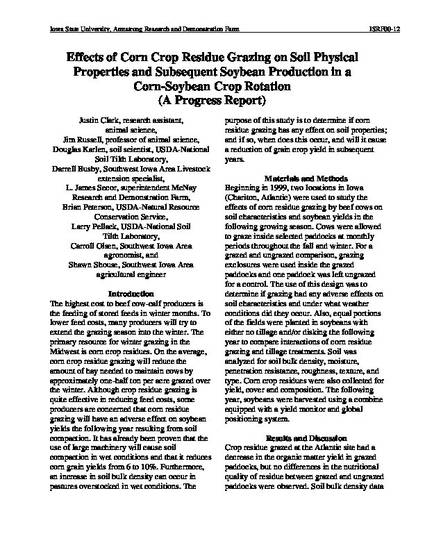
Unpublished Paper
Effects of Corn Crop Residue Grazing on Soil Physical Properties and Subsequent Soybean Production in a Corn-Soybean Crop Rotation (A Progress Report)
Iowa State Research Farm Progress Reports
Farm
Armstrong Research and Demonstration Farm
Publication Date
1-1-2001
Disciplines
Abstract
The highest cost to beef cow-calf producers is the feeding of stored feeds in winter months. To lower feed costs, many producers will try to extend the grazing season into the winter. The primary resource for winter grazing in the Midwest is corn crop residues. On the average, corn crop residue grazing will reduce the amount of hay needed to maintain cows by approximately one-half ton per acre grazed over the winter. Although crop residue grazing is quite effective in reducing feed costs, some producers are concerned that corn residue grazing will have an adverse effect on soybean yields the following year resulting from soil compaction. It has already been proven that the use of large machinery will cause soil compaction in wet conditions and that it reduces corn grain yields from 6 to 10%.
Copyright Owner
Iowa State University
Copyright Date
2001
Language
en
File Format
application/pdf
Citation Information
Justin Clark, James R. Russell, Douglas Karlen, Darrell Busby, et al.. "Effects of Corn Crop Residue Grazing on Soil Physical Properties and Subsequent Soybean Production in a Corn-Soybean Crop Rotation (A Progress Report)" (2001) Available at: http://works.bepress.com/douglas_karlen/42/
